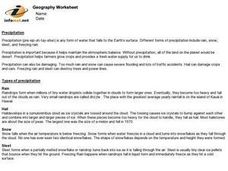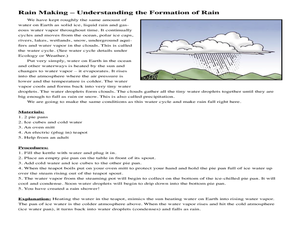Curated OER
Here Today, Gone Tomorrow
Students study the difference between chemical and physical weathering. They explore the effects of climate on the weathering process.
Curated OER
Weather Systems
Fourth graders research weather phenomenon in groups on the Internet and create a slide for the class power point presentation. They include 5 key points (temperature, air pressure, and fronts and descriptions for each type of cloud or...
Curated OER
Weather
In this weather worksheet, students will match 4 weather terms to their correct definition. Vocabulary words include wind, weather, air mass, and front. Then students will complete 3 short answer questions based on high and low air...
Curated OER
Weather Records
Students write newspaper articles using a "weather record" worksheet and information they find in newspapers.
Curated OER
Weather Myths
Fourth graders relate myths to weather phenomenon. They write and illustrated a weather myth and present it to the class.
Curated OER
The Hurricane
In this weather learning exercise, students read a realistic story about a family's experience during a hurricane. Factual information about hurricanes is given. Students then answer 6 questions.
Astronomical Society of the Pacific
Getting Ready for the All American Eclipse!
Give your pupils a front row seat at the biggest light show in the sky this year! In addition to admiring the total solar eclipse, young astronomers can explain the phenomenon with a little help from an inquiry-based instructional...
Curated OER
Precipitation
Fourth graders identify the conditions that create rain. They read and discuss weather records, and write a news article that includes factual information fom one of the listed weather records.
Curated OER
Weather Predictions
Fourth graders explore meteorologists. They explore symbols on a weather map and make five day forecasts.
Curated OER
Weather and Oceans: Uneven Heating of the Earth
Students investigate what causes the heat on Earth. In this Earth heating lesson, students experiment with different heat sources and determine where the Earth gathers the most heat. Students explore vocabulary words associated with...
Curated OER
Precipitation
Learners write their own newspaper article about a weather story using newspapers and a weather records worksheet.
Curated OER
Understanding Cloud Formation
Young scholars read and relate the poem, "Clouds" by Aileen Fisher to a demonstration on cloud formation. They create clouds in jars using ice water and matches then discuss the ways clouds can be used to predict weather.
Curated OER
Building Up, Breaking Down
Students investigate how rocks are modified into construction materials. In this building up and breaking down lesson plan, students explore what happens to building materials over time and how people modify natural materials. Students...
Curated OER
Temperature
Students understand that temperatures in Alaska can be negative numbers. In this temperature lesson, students recognize the temperatures above and below zero. Students compare temperatures using the greater than and less than signs....
Curated OER
Do Some Research: Science 6
In this science research learning exercise, students read the sentence and use a library or the Internet to find the answer and write it on the blue line. Students must then write a report about this topic: two large bodies of air meet....
Curated OER
Dynamic Earth
Young scholars show how earthquakes affect sea waves. In this tidal waves lesson students use a rubber mallet on a table to create waves in a box on top of the table. They experiment with striking the mallet in different locations on the...
Curated OER
Thunderstorms
Fourth graders investigate the attraction between two different charges to explain the concept of lightning in a thunderstorm.
Curated OER
Thar She Blows!
Students identify the advantages and disadvantages of wind farms and turbines. They examine how weather conditions can affect their effectiveness and how engineers are trying to solve the problem. They discover how engineers use this...
Curated OER
Rain Making - Understanding the Formation of Rain
Students read and conduct and experiment to learn about rain formation. In this water forms lesson, students read about the formation of rain and its purposes. Students then complete a rain experiment activity.
Curated OER
Create Your Own Lightning
Students conduct an experiment. In this lightning instructional activity, students use a blanket and a dark room to simulate lightning.
Curated OER
DEW POINT
Fourth graders investigate conditions causing saturation and measure the dew point of the atmosphere performing simple experiments.
Curated OER
Water Cycle in a Box
Fourth graders investigate how the water cycle is vital for all living things to survive on Earth. They observe the teacher set up a simulation of the water cycle using a Plastic Earth Simulator, desk lamp, and water, and make...
Curated OER
Classifying Dog Breeds
Students classify dog breeds. In this animal science lesson, students research various breeds of dogs on the Internet and classify breeds into small, medium, and large breeds. Students illustrate their classification notes with pictures.
Curated OER
Wacky Water Critters
Young scholars visit a local creek or stream. They collect water samples from the creek and observe and sort the "water critters" they find in the sample, observing smaller organisms under a microscope if necessary. They identify each...
Other popular searches
- Weather Fronts and Storms
- Weather Fronts Air Masses
- Weather Fronts Clouds
- Types of Weather Fronts
- Weather Fronts in Paris
- Weather Fronts Activities
- Weather Fronts Symbols
- Weather Fronts Worksheets
- Science Weather Fronts
- Weather Fronts and Air Masses
- Weather Fronts Interview
- Air Fronts and Weather

























